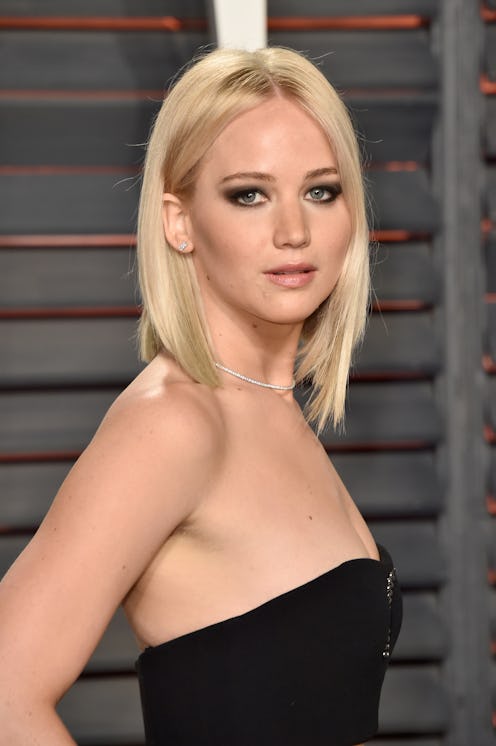Fashion
J. Law's Body Comments Make Me Uncomfortable
The A List's answer to offering the general public someone relatable and simultaneously successful has seemingly been Jennifer Lawrence. The star often tries to represent a new type of celebrity — one who is sometimes on a pedestal, but often falls off it and then makes a joke. However, Jennifer Lawrence's comments on "normal" body types in her recent Harper's Bazaar interview have taken her away from a perfectly crafted "I'm just like you" image, and instead gives us a message that is more alienating than understanding.
The actor's ever-so-slightly larger frame than her on-screen and red carpet counterparts has sometimes led to her being deemed a "curvy" woman. Luckily, Lawrence noted that this is somewhat ridiculous. "I would like us to make a new normal-body type. Everybody says, 'We love that there is somebody with a normal body!' And I'm like, 'I don't feel like I have a normal body,'" she told Harper's Bazaar. "I do Pilates every day. I eat, but I work out a lot more than a normal person. I think we've gotten so used to underweight that when you are a normal weight it's like, 'Oh, my God, she's curvy.' Which is crazy."
Unluckily, she discussed the absurdity of contemporary beauty standards and body shaming by alleging that there is such a thing as a "normal" body in the first place. Things are about to get nuanced, but stick with me.
The issue with describing society's idealized body type, or even just a body type that fits into straight size clothing, as "normal" lies within the word itself. The definition of normal is intrinsically tied to having or being something "usual, typical, or expected." If one type of body is deemed the "normal" one — whether that's the size two catwalk model or Lawrence herself — then the rest become "abnormal."
It could be argued that what Lawrence meant was "average." In suggesting that we re-define normality, perhaps she simply meant equating normality to the average size of an American woman, approximately around a 14. As most of us know, media representation (or the lack thereof) has a lot of folks convinced that the aim of women should be reaching a size four. I'd like to believe that J. Law is just hoping for a time during which being very thin is not exalted above all else.
When ending her discussion about body image, she noted, "The bare minimum, just for me, would be to up the ante." At this point, the reporter noted, "That earthy laugh returns." "At least so I don't feel like the fattest one." It's important to note here that Lawrence did not say, "So that I am not the fattest one in the room." She said, "So I don't feel like the fattest one." This remark (á la that whole Daphne thing in Scooby-Doo ) implies that feeling like the "fattest one," if not being the "fattest one," in a room (or in Hollywood at large) is not a particularly positive fate to face. For those immersed in discussions of body and fat politics, the statement read of someone who would rather not be considered fat, period.
While it is laughable that Lawrence — a thin woman by every measure — could ever be the fattest human in a room, there are perceptible negative connotations to her usage of the word fat here, and particularly of being fat. Lawrence could be wishing for more body diversity in the media and in show business, which is certainly not a negative, but she could also be wishing for larger bodies in her circle just so she doesn't feel like "the fattest one." The former interpretation of her words is ideal, the latter forms a cruel body hierarchy with thinness remaining the goal.
I do not doubt that Lawrence had somewhat good intentions with her words. She was, at least initially, trying to speak out about the thinness that is seemingly required of all women, both in the public eye and otherwise, before being deemed acceptable human beings. However, I cannot help but feel that her quotes come across as shaming rather than supportive.
It's important to note that this isn't the first time Lawrence has tried to discuss body politics and arguably failed. In an interview with Barbara Walters circa 2013, the now 25-year-old commented, "I just think it should be illegal to call somebody fat." It was a statement that reeked of good intentions overshadowed by ignorance. Lawrence made "fat" seem like not only a bad word — something body image and fat positive activists have worked hard to counteract — but also the worst thing a person could be called, let alone actually be.
I'm far from Lawrence's biggest fan, but even I can see that she is trying to start a positive discussion about the pressures placed on people, and especially women, to fit a certain mold. In fact, the issues she is trying to discuss are dialogues that need to be in the open.
However, in order to promote body positivity for herself and others, she should in no way tear down those who need body positive activism most. Being fat is far from the worst thing that can happen to a person, after all.
Want more body positive discussions? Check out the video below, and be sure to subscribe to Bustle's YouTube page for more discourse.
